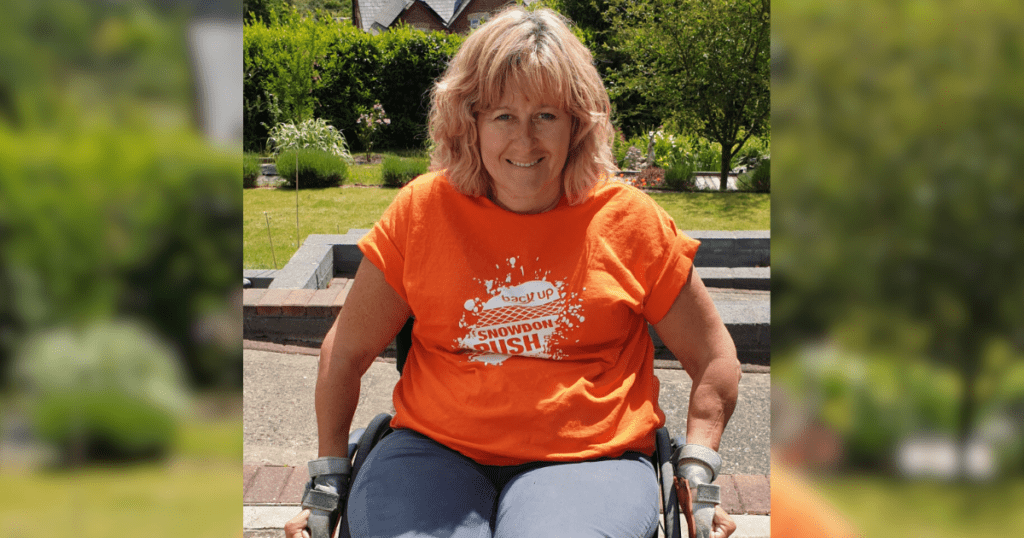Employment and spinal cord injury
16 October 2023

At Back Up, we’re here to help people affected by spinal cord injury get the most out of life. That’s why we have services dedicated to work after spinal cord injury.
We spoke to Becky, our Vocation Specialist, to learn some of her top tips and advice around working with a spinal cord injury. Read on to discover what she has learned from her career!
Can you tell us a bit about your personal experiences with employment after spinal cord injury?
I’m a HR manager by profession, having worked at BT as a graduate, before taking on numerous roles over a 16 year period.
More recently I worked as a consultant, before setting up my own inclusive tourism business.
I’ve always been passionate about employment of disabled people, now I have my dream job at Back Up where I can help people get the confidence and independence needed to get the most out of life.
Can employment be a big worry for newly injured people?
Deciding to return to work, change career, study a new subject or try volunteering after a spinal cord injury, is an important decision. It might take time to adjust to your new situation before thinking about work or volunteering.
Both work and volunteering offer lots of benefits for your mental and physical health. However, we understand that returning to work after spinal cord injury can sometimes feel daunting.
What kind of obstacles will a newly injured person face regarding employment?
The biggest obstacle can often be a lack of confidence. It can sometimes be hard not knowing what kind of work is possible for you post-injury . This is particularly hard for those who know they cannot return to their pre-injury jobs.
Otherwise, practicalities can be an obstacle. For example, your workplace may not be accessible to a wheelchair user. This is why it’s important to remember that your employer has a duty to consider putting adaptations in place to suit your needs at work.
When is the best time to return to work after spinal cord injury?
This is totally up to when it feels right for the individual. Other things can take priority after spinal cord injury, such as housing and setting up care packages.
Some people may want to get back to work in order to fill their time. For others, financial incentives may be a driver. I’d advise those on benefits to reach out to Aspire’s Welfare and Benefits team too.
If you’d like to talk to someone who may have been in the same boat as you, do feel free to contact our mentoring team.
What are some of the benefits of returning to work?
There are a range of benefits to returning to work after spinal cord injury:
- Feeling a sense of self-worth/identity
- Building connections and socialising
- Giving structure and purpose to your time
- Physical and mental activity
- Money
- Learning and developing skills
- Meaning to the concept of leisure
What are some of the adaptations and support your employer can put in place after your injury?
These will depend on the level of your disability, your type of work and your employer. However, there are a number of likely adjustments your employer can put in place. These may includes access to the workplace, flexibility in start and working times, as well as the option to work from home.
The goal of adaptations are to create a level playing field, so you can do your job at the best of your abilities. Be sure to talk to your employer or potential employers about what they can do to remove barriers in the workplace.
The government’s Access to Work scheme, can provide you with funding for equipment and support you may need. Learn more about the scheme at their website.
Do you need to disclose your disability to new/prospective employers?
There is no legal requirement to do so. Disclosing your disability is a personal choice, based on how comfortable you are discussing it. However, if you need adjustments to be put in place for the recruitment process, you will need to request these during the application stages, so they are put in place for you. Do get in touch with our team if you’d like to discuss disclosing your disability with someone who may have also been in your situation.
What are your rights as a disabled employee?
The Equalities Act state that employers are required to ensure that disabled applicants are not treated less favorably than non-disabled employees or applicants. The Act also states that employers should consider reasonable adjustments to both the workplace and the recruitment process, to ensure that disabled individuals can demonstrate their ability to do their job.
Finally, how can Back Up help you get the confidence needed to thrive in work or volunteering after spinal cord injury?
We can help with all the questions or concerns people have – and are happy to provide more detail and support regarding the points above. We provide telephone mentoring and online support services, as well as services dedicated to vocation. Check out our Skills for Work course, Careers Fair, and contact our employment team here. Our next Skills for Work course is taking place on 08-10 November. Check out our website to find out more and to register your interest in attending.


